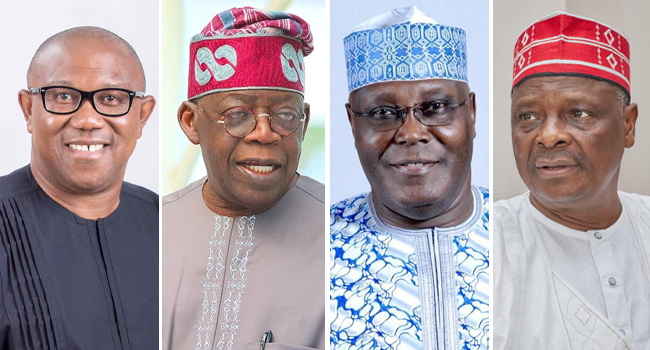With Nigeria’s economy struggling and insecurity rife, four top presidential candidates start campaigning this week for next February’s election in an open race to replace President Muhammadu Buhari, IgbereTV reports

Less than five months before the ballot, no clear frontrunner has emerged with major candidates all confronting challenges on their path to the top political seat in Africa’s most populous country.
After two terms, Buhari steps down with Nigeria battling high inflation, oil production at record lows and security forces battling jihadists, separatist gunmen and criminal gangs across the country.
Top candidates lining up are Bola Tinubu, a former Lagos governor and stalwart of the ruling All Progressives Congress or APC and opposition Peoples Democratic Party or PDP candidate Atiku Abubakar, a former vice president on his sixth bid.
Two other candidates are challenging the dominance of the APC and PDP: Peter Obi, a former state governor generating a following among young Nigerians and another ex-state governor and former minister Rabiu Kwankwaso.
Campaigning starts officially on Wednesday, but five months is an unusually long time for Nigeria, analysts say, increasing risks that party infighting and the north-south ethnic and religious divides will complicate the election buildup.
Since returning to democracy after military rule in 1999, Nigerian elections have been marked by violence, delays, fraud claims and court challenges.
Voter turnout has also been generally low in Nigeria — 33 percent in 2019 — and the two main parties have fielded older candidates seen by many younger Nigerians as offering little change.
That has left room for third party candidates to tap into growing anti-establishment feeling in what analysts see as a highly competitive electoral race.
There are 18 presidential candidates, including one woman. Voters will also elect Senate and Congress lawmakers in the February 25 ballot.
“Unlike the previous six election cycles, the 2023 vote is not likely to be the usual two-horse race,” said Dapo Thomas, history and political science teacher at Lagos university.
Divisions, Splits
Nigeria’s constitution requires candidates to win a simple majority and 25 percent of the vote in two-thirds of the country, a nod to the ethnic and religious makeup.
North Nigeria is predominantly Muslim, the south is mostly Christain and there are more than 200 ethnicities, the largest being Yorub





